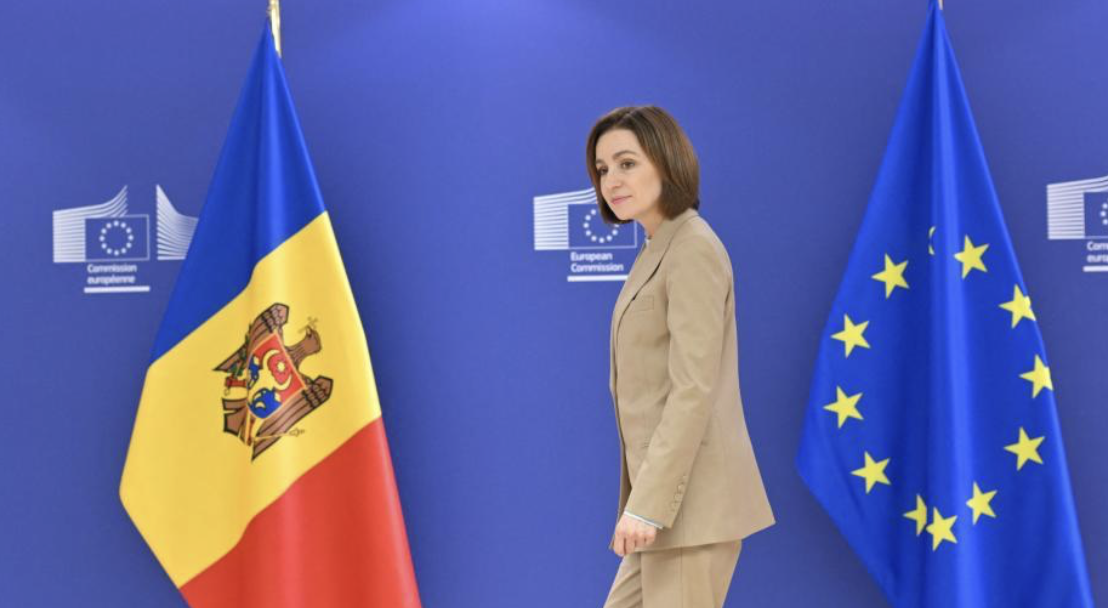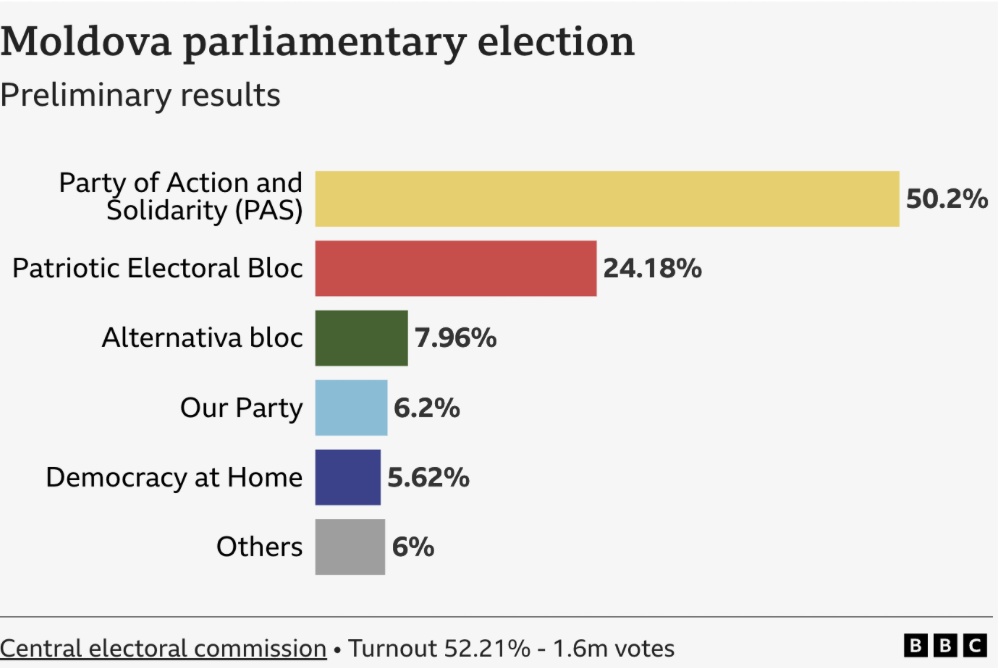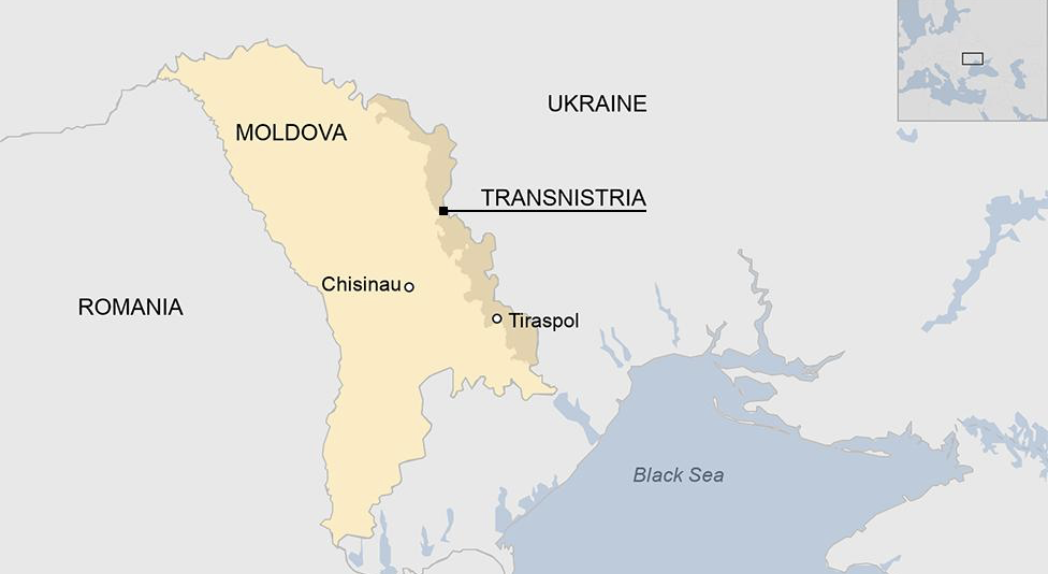EU Enlargement – will Moldova join by 2030?
By Seán Doherty, reading time: 4 minutes
Moldova’s pro-EU President Maia Sandu
https://www.iai.it/en/eventi/conversation-maia-sandu-moldovas-path-europe-amid-regional-turmoil
On 28 September 2025, Moldova’s parliamentary election took place amid significant tension in the former Soviet republic. The choice for many voters was simple: a pro-European party striving for EU membership or a shift back to Russian-friendly relations and heavy Kremlin influence over the nation of 2.5 million inhabitants. In an election viewed as pivotal for the country’s future direction, Moldovan president Maia Sandu’s Action and Solidarity Party (PAS) was pitted against the pro-Russian Patriotic Electoral Bloc. Given Moldova’s EU candidate status since 2022 and Sandu’s intention to join the European Union by 2030, the result has been decisive for Moldova’s future.
Despite severe allegations of Russian interference in the election, Sandu’s pro-EU party went on to outperform pre-election polls and emerge with a convincing majority: just over 50% of the vote. This also means it can form a government without needing any coalition partners, something that could have hindered the party’s EU accession plans. Patriotic Electoral Bloc finished the election in second with 24%. That three-quarters of the 1.6 million voters supported either PAS or Patriotic Electoral Bloc highlights the importance of the election. One could argue that this was a straight shootout between Europe and Russia.
President Sandu’s PAS defeated the Patriotic Electoral Bloc in an election seen as vital by both Brussels and Moscow
https://www.bbc.com/news/articles/cx2rdlj8ejgo
An election period filled with tension and interference
Moldova has accused Russia of using a variety of methods to aggressively interfere in the election, and to pry Moldova away from Europe and back towards Moscow. According to Moldovan authorities, these measures include using proxies to funnel cash into the pro-Russian parties in Moldova, payments to elderly voters in rural areas and spreading anti-western rhetoric through local Orthodox priests. There were also several reports of bomb scares at polling stations abroad; Moldova has a large diaspora of over a million people, many of whom are located in western Europe, and these voters were expected to play an integral role in the election result. Bomb scares were reported in Spain, Italy, Romania, Belgium, and the US. On election day itself, multiple cyber-attacks were reported by the Moldovan authorities, while the main opposition leader, Igor Dodon, denied the results and organised a protest in the country’s capital, Chișinău.
What now for Moldova’s EU path?
Despite all of this, Moldova remains on course for its ambitious goal of achieving EU membership by the end of the decade. The result is without doubt a major victory for Brussels, with the EU having heavily invested in Moldova’s membership aspirations (the EU Growth Plan for Moldova totals €1.8 billion). It will also come as a relief after the events in Georgia last year; in similar circumstances in Tbilisi, the pro-European party suffered a crushing and extremely controversial defeat to the ruling Georgian Dream Party, which has since paused EU membership talks in turn for friendly relations with Russia. The European Union has been very public in its backing of Moldova joinin,g and the result came in for a lot of praise from world leaders, including European Commission President Ursula von der Leyen, who said: “You made your choice clear: Europe. Democracy. Freedom. Our door is open. And we will stand with you every step of the way.” All of this bodes well for Chișinău.
Obstacles to overcome
While the election result marks a huge step in the right direction, there remain some substantial obstacles in Moldova’s path to EU entry. One of these challenges is posed by Hungarian PM and notorious Brussels-Blocker Viktor Orbán, who is currently inhibiting negotiations for Ukraine’s entry to take place in both the European Council and Parliament. This blocking by Hungary is important as Moldova and Ukraine’s EU bids are interlinked, and one being hampered can affect the other. Orbán is heavily criticised for being sympathetic towards Vladimir Putin’s regime.
Another big issue is the strip of land and breakaway region known as Transnistria, a Russian-controlled separatist state locked between Moldova and Ukraine’s border. While the region is internationally recognised as part of Moldova, Transnistria has its own government, currency and de facto capital called Tiraspol. The region, trapped in an old Soviet time capsule that simply doesn’t exist anymore, currently stations 1,500 Russian troops. While the region’s strategic importance and location by the Black Sea is all the more vital since the beginning of the war in Ukraine in 2022, the situation between Moldova and Transnistria has been a frozen conflict for over 30 years. Earlier in the year, Moldovan PM Dorin Recean warned of a Russian plan to send 10,000 more troops to Transnistria if a pro-Russian government came to power in Chișinău.
Map of Transnistria, which is internationally recognised as part of Moldova but controlled by Russia
https://www.bbc.com/news/world-europe-18284837
Final thoughts
It is difficult to imagine Moldova being granted EU membership while the Transnistria situation remains. But it is also important to note that Lithuania was granted membership in 2004 despite neighbouring Kaliningrad, a legitimate part of Russia and a military exclave. This should give President Sandu and the vast majority of the Moldovan people hope as they continue their journey towards EU Membership by 2030. This election was not only important for Moldova, but also for Ukraine and the European Union itself. The results are clear: the Moldovan people want to join the EU, and the small republic remains on course to do so.


